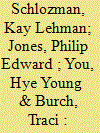|
|
|
Sort Order |
|
|
|
Items / Page
|
|
|
|
|
|
|
| Srl | Item |
| 1 |
ID:
171347


|
|
|
|
|
| Summary/Abstract |
Although the majority of research on revolving-door lobbyists centers on the influence they exercise during their postgovernment careers, relatively little attention is given to whether future career concerns affect the behaviors of revolving-door lobbyists while they still work in government. We argue that the revolving-door incentivizes congressional staffers to showcase their legislative skills to the lobbying market in ways that affect policymaking in Congress. Using comprehensive data on congressional staffers, we find that employing staffers who later become lobbyists is associated with higher legislative productivity for members of Congress, especially in staffers’ final terms in Congress. It also is associated with increases in a member’s bill sponsorship in the areas of health and commerce, the topics most frequently addressed by clients in the lobbying industry, as well as granting more access to lobbying firms. These results provide the systematic empirical evidence of pre-exit effects of the revolving-door among congressional staff.
|
|
|
|
|
|
|
|
|
|
|
|
|
|
|
|
| 2 |
ID:
142737


|
|
|
|
|
| Summary/Abstract |
This article documents the prevalence in organized interest politics in the United States of organizations—for example, corporations, think tanks, universities, or hospitals—that have no members in the ordinary sense and analyzes the consequences of that dominance for the democratic representation of citizen interests. We use data from the Washington Representatives Study, a longitudinal data base containing more than 33,000 organizations active in national politics in 1981, 1991, 2001, 2006, and 2011. The share of membership associations active in Washington has eroded over time until, in 2011, barely a quarter of the more than 14,000 organizations active in Washington in 2011 were membership associations, and less than half of those were membership association with individuals as members. In contrast, a majority of the politically involved organizations were memberless organizations, of which nearly two-thirds were corporations. The dominance of memberless organizations in pressure politics raises important questions about democratic representation. Studies of political representation by interest groups raise several concerns about democratic inequalities: the extent to which representation of interests by groups is unequal, the extent to which groups fail to represent their members equally, and the extent to which group members are unable to control their leaders. All of the dilemmas that arise when membership associations advocate in politics become even more intractable when organizations do not have members.
|
|
|
|
|
|
|
|
|
|
|
|
|
|
|
|
|
|
|
|
|